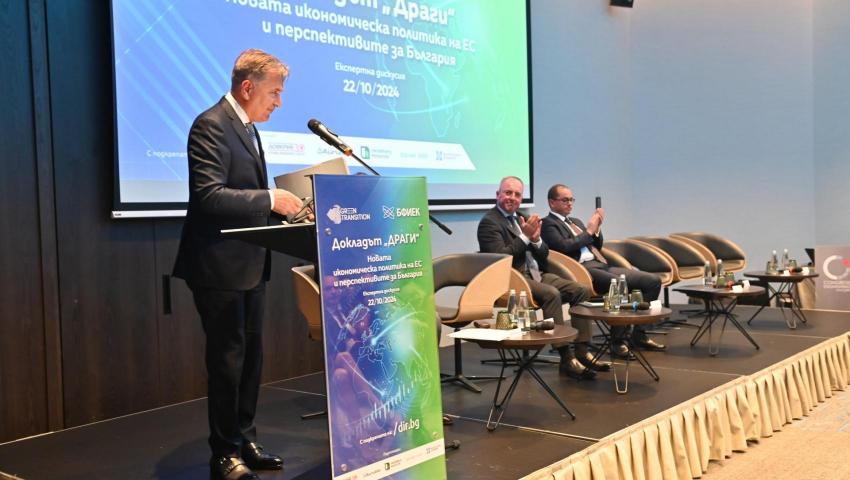Minister Nikolov: The EU must come up with a plan for decarbonization and competitiveness

Our position puts on the agenda measures and solutions that, although laid down in the report, need rethinking and additional analyzes and solutions in order to respond to realities both in key sectors and in the context in Bulgaria
In order to increase the competitiveness of the European economy, it is necessary to focus policy on industry and support the green and digital transition. This was said by the Acting Minister of Economy and Industry, Petko Nikolov, during the expert discussion "The Dragi Report - the new economic policy of the EU and the prospects for Bulgaria". The event is a first-of-its-kind expert conversation with representatives of the government and Bulgarian business, organized by the dialogue platform Green Transition Forum and the Bulgarian Federation of Industrial Energy Consumers (BFIEC).
Minister Nikolov noted that the achievement of competitiveness of the industry is among the conditions for increasing the prosperity of all citizens in Europe.
Mario Dragi's report was presented in September to the European Parliament and examines the main challenges and opportunities facing Europe and its industrial sector, as well as proposing measures to strengthen the EU's competitiveness.
Minister Nikolov presented the assessment of the Ministry of Economy and Industry (MEI) on the "Dragi" report, saying that it was positive. The MEI considers that the three areas of action outlined in the report to achieve sustainable growth - overcoming the lag in innovation, a joint plan for decarbonization and competitiveness and increasing security and reducing the Union's dependencies, are adequate, timely and imperative. They support the conclusion that urgent measures are necessary to significantly increase productivity and achieve growth. We find the provision of additional investments in the amount of about 800 billion euros per year in the Union for the restoration of Europe itself to be a slightly ambitious goal, one can think about this issue, but this is not the main problem, Nikolov pointed out.
Our position puts on the agenda measures and solutions which, although laid down in the report, need rethinking and additional analyzes and solutions in order to respond to realities both in key sectors and in the context in Bulgaria, said the minister. He added that in certain cases the granting of additional powers, the creation of separate jurisdictions or the joint purchase of goods may be incompatible with the characteristics of our economy such as the size of the national budget, legislation, production activity.
The MEI's assessment of the report expressed support for the document's highlighted need for changes in industrial and trade policy in the EU, focusing on investment in innovation, clean energy technologies and much better coordination between member states, Nikolov said, adding that this is something that at this stage, according to the MEI and according to the Draghi report, is in doubt. This is necessary to maintain competitiveness in the Union on global markets and to increase the predictability and stability of innovation-oriented funding. Particularly important are the reduction of energy prices, the provision of supply chains and, if possible, the strengthening of trade relations with key partners, the minister noted.
Petko Nikolov also pointed out that, according to the MEI, the messages in the report regarding the energy plans and the future development of the industry are key. We believe that the industry should rely on European support in the recently complicated processes of the decarbonization of enterprises, and where the technologies have reached their limit, the activity of the industry should be supported through regulatory changes, Nikolov said. He added that the progress should not leave behind the vulnerable groups, who represent an additional labor force that could, under certain conditions, be sufficiently mobilized to achieve the common goals.
We all know that energy prices in the Union are high, which deters investment, and climate goals are difficult to achieve in a medium-term plan for enterprises from energy-intensive sectors, Minister Nikolov also noted.
To make the energy transition a reality, the EU should synchronize all its policies with the climate goals and come up with a joint decarbonisation and competitiveness plan, in our opinion, that covers energy producers, clean technologies of energy-intensive companies, which is difficult to reduce their emissions, the minister said. He added that, in this regard, MEI supports the key objectives in the report to create such a joint decarbonisation plan so that competitiveness is accelerated in the most economically efficient way possible.
